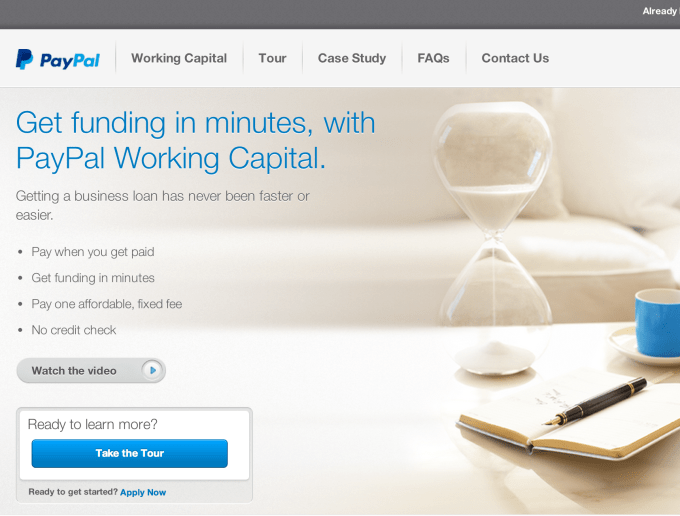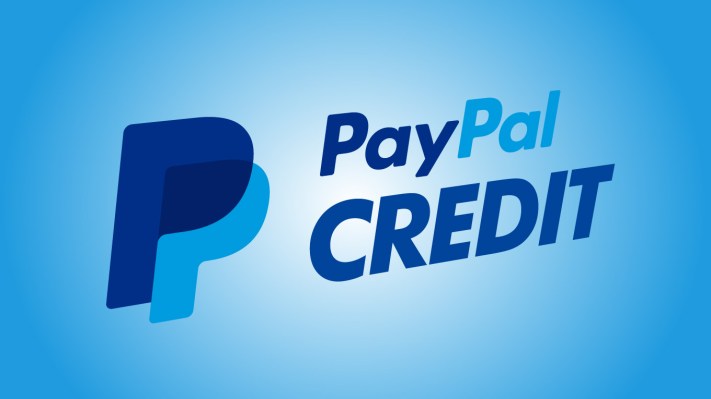Touting its increasing focus on credit products for both consumers and small businesses, PayPal today announced it is rebranding its Bill Me Later service as “PayPal Credit,” while that and its PayPal Working Capital business loans service are now destined for international expansions.
PayPal Credit is soon being rolled out to the U.K. and Germany, while PayPal Working Capital is headed to the U.K., as previously reported, as well as Australia.
According to PayPal’s VP of Credit, Steve Allocca, these changes are part of the company’s larger efforts to “bring credit more to the center of PayPal.” He says the businesses credit products drive engagement and usage in its network – meaning, simply put, PayPal and eBay buyers buy more, and sellers sell more.
Spend goes up 30% after a customer adopts a PayPal credit vehicle, he notes, citing previous studies at the company, whether that’s the Bill Me Later service or the GE-issued PayPal credit card.
That card, by the way, is on its way to become a deeper part of PayPal, the company revealed in its latest earnings. While GE has agreed to service that billion-dollar portfolio over the next two years, PayPal will buy that portfolio in 2016 as part of its strategy to increase and expand its credit offerings.
These changes are not only about making PayPal a consumer’s preferred option when shopping online, but speak to the company’s longer-term ambitions to compete on mobile as well as in the real world, at point-of-sale.
“[Credit is] especially important to us as we look to expand into the offline world and omni-channel,” says Allocca. “It’s going to be all the more important for us to have more levers to proactively manage and control our transaction expense,” he explains.
Bill Me Later Becomes PayPal Credit, More Changes Ahead
In addition to the rebranding of Bill Me Later, the service itself will be seeing increased functionality in the months ahead, including a transition away from being an online-only product and more functionality around monthly payments. In addition, more servicing of that portfolio will be done within PayPal Wallet instead of on a standalone website as is done today. The idea is to reduce the steps and the barriers between PayPal and PayPal Credit (Bill Me Later) which are currently present, Allocca says.
Further down the road, PayPal will expand Credit more directly to retail and point-of-sale, but that’s not its current focus.
While the company declines to break out how many of its customers use one of its credit products, Allocca would say that between PayPal Credit and PayPal Working Capital combined, it’s in the “millions.”

Working Capital
Working Capital, however, is still in private, invite-only testing. Since the pilot began in September of last year, over 20,000 businesses have borrowed more than $150 million from PayPal and its lending partner, WebBank. And, adds Darrell Esch, VP of SMB Lending at PayPal, businesses are now borrowing $1 million per day, with 60% of the loans going to eBay sellers.
That business competes with a variety of newcomers entering the small business lending market – the fallout of the financial crisis which made it more difficult for small business to access capital. Today, there are a number of companies for small businesses to choose from beyond PayPal, including recently funded (another $65 million) Funding Circle, Kabbage, Lending Club, CAN Capital, OnDeck, Fundera, Fundbox, and others.
What makes PayPal’s business unique, Esch says, is that its credit decisions are driven by customers’ sales histories with eBay and PayPal, allowing the company to make instant lending decisions in minutes that are tailored to its customer base using its own internal data.
He adds also that PayPal doesn’t view those other startups and businesses as competitors.
“We don’t think of this as competing with the new entrants out there, but just providing a service customers are going to love,” says Esch. “A lot of those newer startups are in it as single lines of business – they are providing credit and their earning are based solely on credit economics. We, at the heart, are still a commerce company.”
